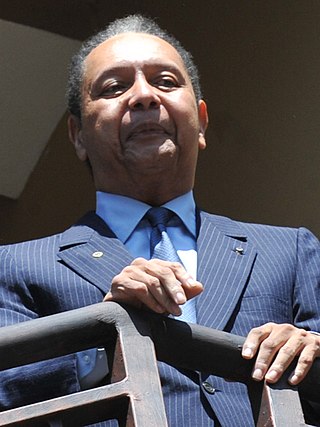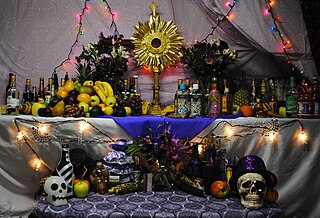Related Research Articles

A dictatorship is an autocratic form of government which is characterized by a leader, or a group of leaders, who hold governmental powers with few to no limitations. Politics in a dictatorship are controlled by a dictator, and they are facilitated through an inner circle of elites that includes advisers, generals, and other high-ranking officials. The dictator maintains control by influencing and appeasing the inner circle and repressing any opposition, which may include rival political parties, armed resistance, or disloyal members of the dictator's inner circle. Dictatorships can be formed by a military coup that overthrows the previous government through force or they can be formed by a self-coup in which elected leaders make their rule permanent. Dictatorships are authoritarian or totalitarian, and they can be classified as military dictatorships, one-party dictatorships, personalist dictatorships, or absolute monarchies.

Haiti, officially the Republic of Haiti, is a country on the island of Hispaniola in the Caribbean Sea, east of Cuba and Jamaica, and south of The Bahamas. It occupies the western three-eighths of the island, which it shares with the Dominican Republic. Haiti is the third largest country in the Caribbean, and with an estimated population of 11.4 million, is the most populous Caribbean country. The capital and largest city is Port-au-Prince.

François Duvalier, also known as Papa Doc, was a Haitian politician who served as the president of Haiti from 1957 until his death in 1971. He was elected president in the 1957 general election on a populist and black nationalist platform. After thwarting a military coup d'état in 1958, his regime rapidly became more autocratic and despotic. An undercover government death squad, the Tonton Macoute, indiscriminately tortured or killed Duvalier's opponents; the Tonton Macoute was thought to be so pervasive that Haitians became highly fearful of expressing any form of dissent, even in private. Duvalier further sought to solidify his rule by incorporating elements of Haitian mythology into a personality cult.

Baron Samedi, also written Baron Samdi, Bawon Samedi or Bawon Sanmdi, is one of the lwa of Haitian Vodou. He is a lwa of the dead, along with Baron's numerous other incarnations Baron Cimetière, Baron La Croix and Baron Criminel.

Jean-Claude Duvalier, nicknamed "Baby Doc", was a Haitian politician who was the President of Haiti from 1971 until he was overthrown by a popular uprising in February 1986. He succeeded his father François "Papa Doc" Duvalier as the ruler of Haiti after his death in 1971. After assuming power, he introduced cosmetic changes to his father's regime and delegated much authority to his advisors. Thousands of Haitians were tortured and killed, and hundreds of thousands fled the country during his presidency. He maintained a notoriously lavish lifestyle while poverty among his people remained the most widespread of any country in the Western Hemisphere.

Rafael Leónidas Trujillo Molina, nicknamed El Jefe, was a Dominican military commander and dictator who ruled the Dominican Republic from August 1930 until his assassination in May 1961. He served as president from 1930 to 1938 and again from 1942 to 1952, ruling for the rest of his life as an unelected military strongman under figurehead presidents. His rule of 31 years, known to Dominicans as the Trujillo Era, was one of the longest for a non-royal leader in the world, and centered around a personality cult of the ruling family. It was also one of the most brutal; Trujillo's security forces, including the infamous SIM, were responsible for perhaps as many as 50,000 murders. These included between 12,000 and 30,000 Haitians in the infamous Parsley massacre in 1937, which continues to affect Dominican-Haitian relations to this day.
The Tonton Macoute or simply the Macoute, was a Haitian paramilitary and secret police force created in 1959 by dictator François "Papa Doc" Duvalier. Haitians named this force after the Haitian mythological bogeyman, Tonton Macoute, who kidnaps and punishes unruly children by snaring them in a gunny sack before carrying them off to be consumed for breakfast. The Macoute were known for their brutality, state terrorism, and assassinations. In 1970, the militia was renamed the Volontaires de la Sécurité Nationale. Though formally disbanded in 1986, its members continued to terrorize the country.

Homosexuality in Haitian Vodou is religiously acceptable and homosexuals are allowed to participate in all religious activities. However, in West African countries with major conservative Christian and Islamic views on LGBTQ people, the attitudes towards them may be less tolerant if not openly hostile and these influences are reflected in African diaspora religions following Atlantic slave trade which includes Haitian Vodou.
A bokor (male) or caplata (female) is a Vodou priest or priestess for hire in Haiti who is said to serve the loa, "'with both hands', practicing for both good and evil." Their practice includes the creation of zombies and of ouangas.
Arará is an African diasporic religion that developed in Cuba during the late 19th century. It is sometimes regarded as a distinct religion of its own, and at other times as a variant of Santería.

Haitian Vodou is an African diasporic religion that developed in Haiti between the 16th and 19th centuries. It arose through a process of syncretism between several traditional religions of West and Central Africa and Roman Catholicism. There is no central authority in control of the religion and much diversity exists among practitioners, who are known as Vodouists, Vodouisants, or Serviteurs.
Michael Paul Bertiaux is an American occultist, known for his book Voudon Gnostic Workbook (1988), a 615-page compendium of various occult lessons and research papers spanning the sub-fields of Voodoo, Neo-Pythagoreanism, Thelema and Gnosticism. Long considered by occultists one of the underground classics of 20th century occultism, the book was out of print for many years and fetched increasingly high prices in the antiquarian market before it was reprinted in paperback by Red Wheel/Weiser in 2007. Note that the unique spelling of "voudon" is an innovation of Bertiaux's,. Bertiaux also coined the term vudutronics to refer to his idiosyncratic interpretation of this religion.
Richard Auguste Morse is a Puerto-Rican-born Haitian-American musician and hotel manager currently residing in Port-au-Prince, Haiti. Morse manages the Hotel Oloffson, and is the founder of a mizik rasin band, RAM, named after his initials. Morse is married to the band's lead female vocalist, Lunise Morse, and has two children. Morse and his band are famous in Haiti for their political songs and performances critical of the Raoul Cédras military junta from 1991 to 1994. In the early 2000s, Morse has also criticized Jean-Bertrand Aristide and Fanmi Lavalas through his music. Morse is a United States citizen. His cousin Michel Martelly is a musician, right-wing Haitian politician and former President of Haiti. Richard Morse repeatedly expressed support for Martelly in the 2010 presidential elections in Haiti. By the end of 2012, he had distanced himself from the Martelly government.
The Parsley massacre was a mass killing of Haitians living in the Dominican Republic's northwestern frontier and in certain parts of the contiguous Cibao region in October 1937. Dominican Army troops from different areas of the country carried out the massacre on the orders of Dominican dictator Rafael Trujillo.

Akan religion comprises the traditional beliefs and religious practices of the Akan people of Ghana and eastern Ivory Coast. Akan religion is referred to as Akom. Although most Akan people have identified as Christians since the early 20th century, Akan religion remains practiced by some and is often syncretized with Christianity. The Akan have many subgroups, so the religion varies greatly by region and subgroup. Similar to other traditional religions of West and Central Africa such as West African Vodun, Yoruba religion, or Odinani, Akan cosmology consists of a senior god who generally does not interact with humans and many gods who assist humans.
A right-wing dictatorship, sometimes also referred to as a rightist dictatorship or right-wing authoritarianism, is an authoritarian or sometimes totalitarian regime following right-wing policies. Right-wing dictatorships are typically characterized by appeals to traditionalism, the protection of law and order and often the advocacy of nationalism, and justify their rise to power based on a need to uphold a conservative status quo. Examples of right-wing dictatorships may include anti-communist ones, such as Nazi Germany, Fascist Italy, Estado Novo, Francoist Spain, the Chilean Junta, the Greek Junta, the Brazilian military dictatorship, the Argentine Junta, Republic of China under Chiang Kai-shek, South Korea when it was led by Syngman Rhee, Park Chung Hee, and Chun Doo-hwan, a number of military dictatorships in Latin America during the Cold War, and those that agitate anti-Western sentiments, such as Russia under Vladimir Putin.

The Anti-Duvalier protest movement was a series of demonstrations in Haiti from 23 May 1984 to 7 February 1986 that led to the overthrow of President Jean-Claude Duvalier and the Duvalier dynasty regime and the readoption of the original flag and coat of arms of the country.
The religion of Haitian Vodou has been present in Cuba since at least the 18th century. It was transmitted to the island by Haitian migrants, the numbers of whom grew rapidly in the early 20th century, and is primarily practised by their descendants. It is distributed primarily in eastern parts of the island, especially in Oriente. In Cuba, some practitioners of Haitian Vodou have also become involved in the related Afro-Cuban religion of Santería.

Haitian Vodou art is art related to the Haitian Vodou religion. This religion has its roots in West African traditional religions brought to Haiti by slaves, but has assimilated elements from Europe and the Americas and continues to evolve. The most distinctive Vodou art form is the drapo Vodou, an embroidered flag often decorated with sequins or beads, but the term covers a wide range of visual art forms including paintings, embroidered clothing, clay or wooden figures, musical instruments and assemblages. Since the 1950s there has been growing demand for Vodou art by tourists and collectors.
Flore Zéphir was a Haitian American academic and author.
References
- Taylor, Patrick (2001), Nation Dance: Religion, Identity and Cultural Difference in the Caribbean, Bloomington Indiana University Press, ISBN 978-0-253-10858-6
- Zephir, Flore (2004), The Haitian Americans, Greenwood Publishing Group, ISBN 978-0-313-32296-9